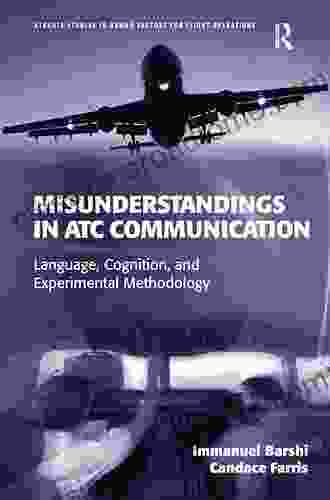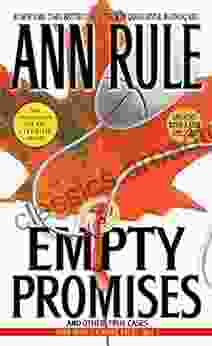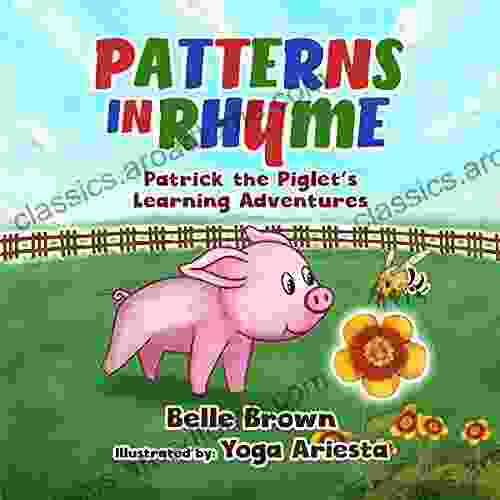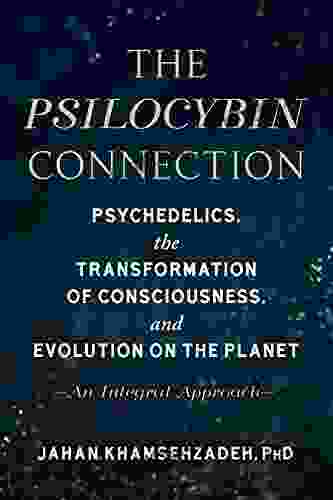Psychedelics: The Transformation Of Consciousness And Evolution On The Planet

By [Author's Name]
Psychedelics have been used for centuries by indigenous cultures around the world for spiritual and healing purposes. In recent years, there has been a growing interest in the potential of these substances to treat a wide range of mental health conditions, including depression, anxiety, and addiction.
4.7 out of 5
| Language | : | English |
| File size | : | 1600 KB |
| Text-to-Speech | : | Enabled |
| Screen Reader | : | Supported |
| Enhanced typesetting | : | Enabled |
| Word Wise | : | Enabled |
| Print length | : | 352 pages |
This book explores the science, history, and cultural significance of psychedelics. It provides a comprehensive overview of the latest research on the effects of these substances on the brain and mind. It also discusses the potential benefits and risks of psychedelic use, and offers guidance on how to use these substances safely and responsibly.
The Science of Psychedelics
Psychedelics are a class of drugs that alter perception, mood, and consciousness. They work by binding to serotonin receptors in the brain. Serotonin is a neurotransmitter that is involved in a variety of functions, including mood, appetite, and sleep.
When psychedelics bind to serotonin receptors, they can cause a number of changes in brain activity. These changes can lead to a variety of effects, including:
- Altered perceptions of time and space
- Enhanced creativity and problem-solving abilities
- Increased empathy and compassion
- Reduced anxiety and depression
Psychedelics can also have a profound impact on the way we experience the world. They can lead to a sense of awe and wonder, and they can help us to connect with our inner selves and the natural world.
The History of Psychedelics
Psychedelics have been used by humans for thousands of years. The earliest evidence of psychedelic use dates back to prehistoric cave paintings. Psychedelics were also used by the ancient Greeks, Romans, and Egyptians.
In the 20th century, psychedelics were rediscovered by Western scientists. In the 1950s and 1960s, there was a great deal of research on the potential therapeutic benefits of these substances. However, this research was halted in the 1970s due to concerns about the potential for abuse.
In recent years, there has been a resurgence of interest in psychedelic research. This is due in part to the growing evidence of the potential benefits of these substances for treating a wide range of mental health conditions.
The Cultural Significance of Psychedelics
Psychedelics have played a significant role in human culture throughout history. They have been used for spiritual, healing, and creative purposes. Psychedelics have also been used to explore the nature of consciousness and reality.
In the 1960s, psychedelics were associated with the counterculture movement. They were seen as a way to break free from the constraints of society and to expand the mind.
Today, psychedelics are still used by some people for spiritual and creative purposes. They are also being used by researchers to study the nature of consciousness and to develop new treatments for mental health conditions.
The Future of Psychedelics
The future of psychedelics is uncertain. However, there is a growing body of evidence that these substances have the potential to transform consciousness and evolve the planet. As research continues, we may learn more about the benefits and risks of psychedelic use, and we may find new ways to use these substances to improve our lives.
Psychedelics are a powerful tool that can be used to transform consciousness and evolve the planet. However, it is important to use these substances safely and responsibly. If you are interested in trying psychedelics, please do your research and talk to your doctor.
4.7 out of 5
| Language | : | English |
| File size | : | 1600 KB |
| Text-to-Speech | : | Enabled |
| Screen Reader | : | Supported |
| Enhanced typesetting | : | Enabled |
| Word Wise | : | Enabled |
| Print length | : | 352 pages |
Do you want to contribute by writing guest posts on this blog?
Please contact us and send us a resume of previous articles that you have written.
 Book
Book Novel
Novel Page
Page Chapter
Chapter Text
Text Story
Story Genre
Genre Reader
Reader Library
Library Paperback
Paperback E-book
E-book Magazine
Magazine Newspaper
Newspaper Paragraph
Paragraph Sentence
Sentence Bookmark
Bookmark Shelf
Shelf Glossary
Glossary Bibliography
Bibliography Foreword
Foreword Preface
Preface Synopsis
Synopsis Annotation
Annotation Footnote
Footnote Manuscript
Manuscript Scroll
Scroll Codex
Codex Tome
Tome Bestseller
Bestseller Classics
Classics Library card
Library card Narrative
Narrative Biography
Biography Autobiography
Autobiography Memoir
Memoir Reference
Reference Encyclopedia
Encyclopedia Andrea Lieberstein
Andrea Lieberstein Ann M Holloway
Ann M Holloway Immanuel Barshi
Immanuel Barshi Andrew Greet
Andrew Greet Janet Mcdonald
Janet Mcdonald Jerry Levitan
Jerry Levitan Andrew Keen
Andrew Keen Amy Ferris
Amy Ferris Kathleen Power
Kathleen Power Amy Johnson Frykholm
Amy Johnson Frykholm Ann Deeley
Ann Deeley Andy Rae
Andy Rae Ross Bleckner
Ross Bleckner Jordan A Parsons
Jordan A Parsons Ian Castle
Ian Castle Andreas Miles Novelo
Andreas Miles Novelo Andrew W Trask
Andrew W Trask Ziona Aviram
Ziona Aviram Andrew R Highsmith
Andrew R Highsmith Dorothy Gable
Dorothy Gable
Light bulbAdvertise smarter! Our strategic ad space ensures maximum exposure. Reserve your spot today!

 Tony CarterDiscover the True Meaning of Life with "Discovering Who Jesus Is" Lifeguide...
Tony CarterDiscover the True Meaning of Life with "Discovering Who Jesus Is" Lifeguide...
 Darius CoxBritish Warships In The Age Of Sail 1793 1817: Unveiling the Majestic Vessels...
Darius CoxBritish Warships In The Age Of Sail 1793 1817: Unveiling the Majestic Vessels... Julian PowellFollow ·5.3k
Julian PowellFollow ·5.3k Christian BarnesFollow ·5k
Christian BarnesFollow ·5k Cason CoxFollow ·9.1k
Cason CoxFollow ·9.1k Mike HayesFollow ·9.2k
Mike HayesFollow ·9.2k Cristian CoxFollow ·7.2k
Cristian CoxFollow ·7.2k Salman RushdieFollow ·9.3k
Salman RushdieFollow ·9.3k Curtis StewartFollow ·10k
Curtis StewartFollow ·10k Troy SimmonsFollow ·9.3k
Troy SimmonsFollow ·9.3k

 Braden Ward
Braden WardThe True Story of Murder and Betrayal
In a small town where...

 W. Somerset Maugham
W. Somerset MaughamUnraveling the Complexities of Human Language: A...
Language is a fundamental aspect of human...

 Ibrahim Blair
Ibrahim BlairTrue Crime Tales That Will Keep You on the Edge of Your...
Prepare to be...

 Rick Nelson
Rick NelsonPatterns In Rhyme: A Journey of Discovery with Patrick...
Welcome to the...

 Edgar Hayes
Edgar HayesWithout Pity: Unmasking the Evil Within
In the realm of true...

 Cooper Bell
Cooper BellFannie Lou Hamer's Indelible Legacy: Unraveling the...
The Black Freedom Movement, a pivotal...
4.7 out of 5
| Language | : | English |
| File size | : | 1600 KB |
| Text-to-Speech | : | Enabled |
| Screen Reader | : | Supported |
| Enhanced typesetting | : | Enabled |
| Word Wise | : | Enabled |
| Print length | : | 352 pages |








